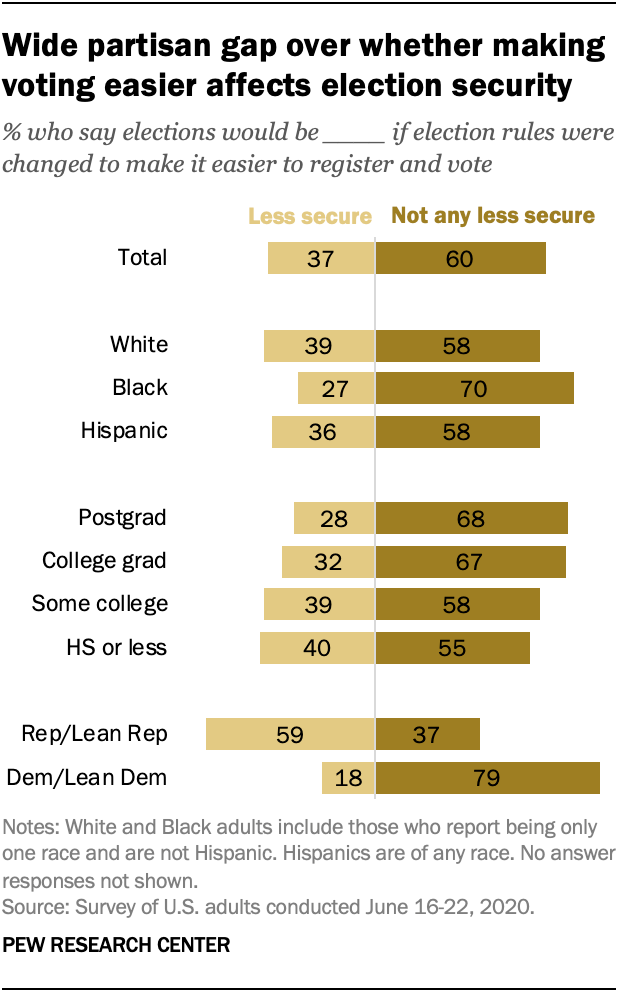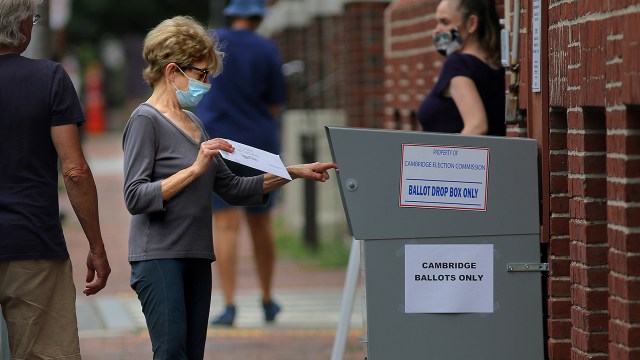
Many Americans are concerned about voting in November amid the coronavirus pandemic and worries over the U.S. Postal Service’s capacity to deliver ballots on time. Democrats, however, are more concerned than Republicans about the ease of voting and the broader integrity of the election. Public attitudes about several voting-related policy proposals – from automatically registering all eligible citizens to vote to expanding the availability of “no excuse” early and absentee voting – also differ sharply by partisan affiliation.
With less than two months before Election Day, here’s a look at Americans’ views about voting in 2020 and how these views differ by party, based on Pew Research Center surveys and analyses conducted this year.

In an April survey, two-thirds of U.S. adults said the coronavirus outbreak is likely to significantly disrupt Americans’ ability to vote in November. Around a quarter of adults (23%) said a significant disruption is very likely, while another 44% said it is somewhat likely. Democrats and Democratic-leaning independents were 30 percentage points more likely than Republicans and GOP leaners (80% vs. 50%) to say it is at least somewhat likely that COVID-19 will significantly disrupt the election. (The survey was conducted relatively early into the U.S. coronavirus outbreak, before cases and deaths spiked across much of the country. It’s possible attitudes may have changed since then.)
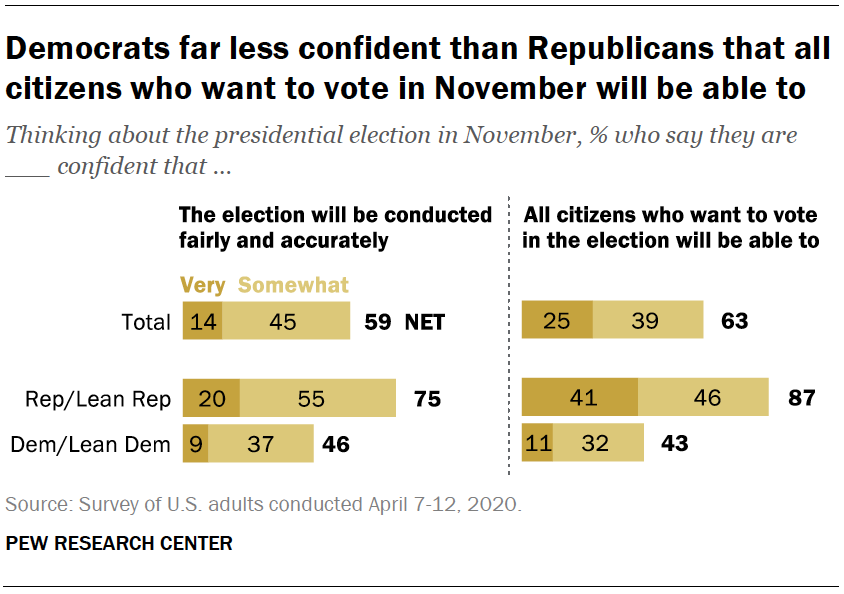
In the same survey, Republicans were far more likely than Democrats to express confidence that the election will be conducted fairly and that all citizens who want to vote will be able to do so. Overall, majorities of Americans said they are at least somewhat confident that the election will be conducted fairly and accurately (59%) and that all citizens who want to vote will be able to do so (63%). But Republicans were far more likely than Democrats to express confidence on both fronts. Three-quarters of Republicans expressed confidence that the election will be fair and accurate, compared with 46% of Democrats. An even larger majority of Republicans (87%) said they are confident that all citizens who want to vote will be able to, compared with just 43% of Democrats.
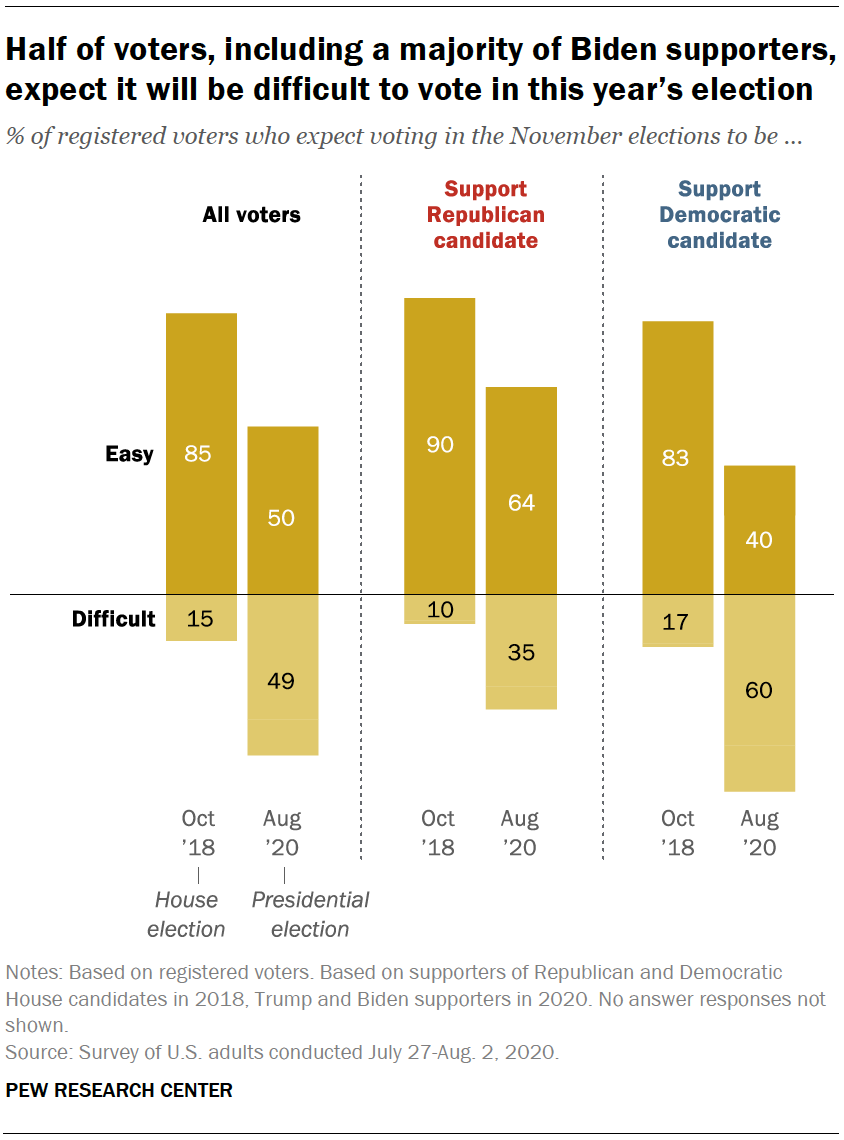
Far more voters expect voting to be difficult this year than in 2018, according to a survey of registered voters conducted July 27 to Aug. 2. Around half of registered voters (49%) said they expect voting to be very or somewhat difficult this year, while the other half (50%) expect it to be very or somewhat easy. That represents a major change from October 2018, when just 15% of voters said they expected voting in that year’s midterms to be difficult and 85% said they expected it to be easy.
In both partisan coalitions, voters are more likely to say voting will be difficult this year than in 2018. But voters who support or lean toward Joe Biden are far more likely to expect voting difficulties than those who support or lean toward Donald Trump (60% vs. 35%).
Attitudes about whether it will be easy or difficult to vote in November vary by state, especially among Biden supporters. Around six-in-ten registered voters in states that conduct their elections almost entirely by mail (61%) expect it to be easy to cast a ballot this year, compared with 44% of voters in states that are more restrictive and require an excuse other than COVID-19 to vote by mail. But these differences in expectations by state exist only among Biden supporters. For example, 57% of Biden supporters in states that will conduct November’s election entirely by mail expect voting will be easy; by comparison, 31% who live in states where an excuse is required to vote absentee – and where concerns about COVID-19 are not acceptable as an excuse – expect it will be easy to vote. The expectations of Trump supporters do not vary significantly across states with different voting laws: Most (64%) expect voting to be very or somewhat easy.
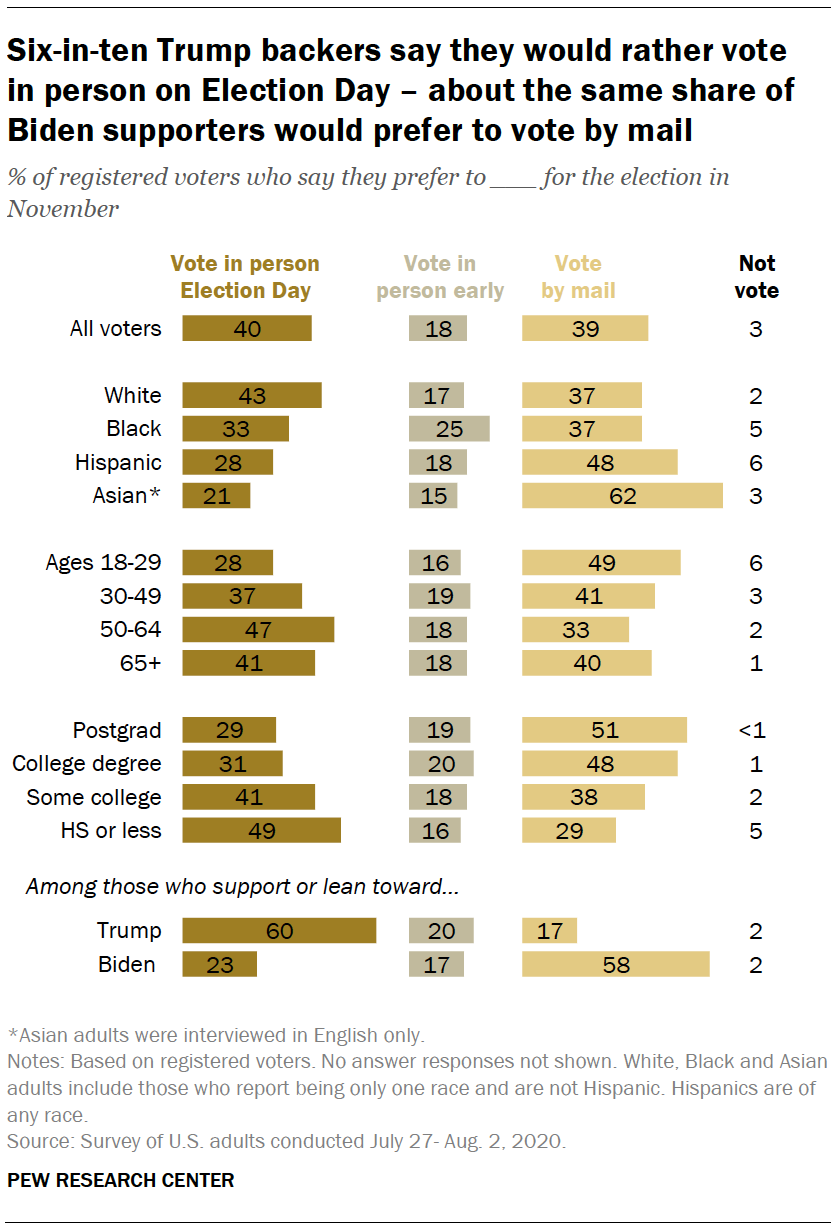
Most Trump supporters prefer to vote in person in November, while most Biden supporters prefer to vote by mail, according to the July 27-Aug. 2 survey. Trump and Biden backers have nearly inverse preferences for voting in the fall. Six-in-ten Trump supporters prefer to vote in person on Election Day, while 17% prefer to vote by mail. Biden supporters are far more likely to prefer to vote by mail than in person (58% vs. 23%). Around one-in-five in both groups – 20% of Trump supporters and 17% of Biden supporters – prefer to vote in person before Election Day.
Voting preferences also differ notably by educational attainment. Voters with a high school diploma or less education are much more likely to prefer to vote in person on Election Day than through the mail (49% vs. 29%). The reverse is true among those with a bachelor’s degree (48% vs. 31%) and those with a postgraduate degree (51% vs. 29%).
Democrats and Republicans differ widely on proposed changes to voting procedures. In the Center’s April survey, majorities of Americans said they strongly or somewhat favor allowing any voter to cast their ballot by mail if they want to (70%) and automatically registering all eligible citizens to vote (69%). Around half (52%) said they favor conducting all elections by mail, and around four-in-ten (42%) expressed support for removing people from registration lists if they haven’t recently voted or confirmed their registration.
But partisan differences were wide on all four of these items. Democrats were much more likely than Republicans to strongly or somewhat favor allowing any voter to cast their ballot by mail if they want to (87% vs. 49%), automatically registering all eligible citizens to vote (84% vs. 53%) and conducting all elections by mail (69% vs. 32%). Republicans, in turn, were much more likely than Democrats to favor removing people from registration lists if they haven’t voted or confirmed their registration (63% vs. 24%).
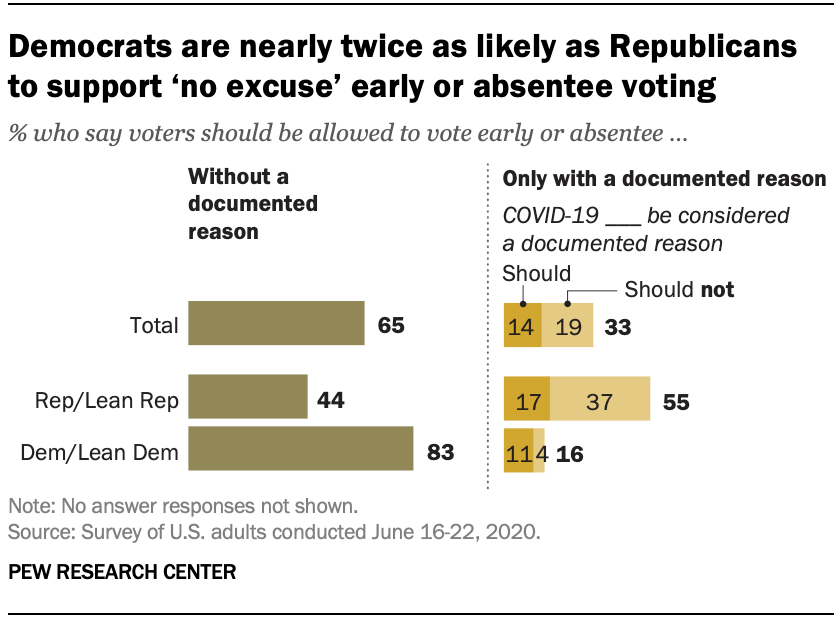
Democrats and Republicans also differ over so-called “no excuse” absentee or early voting, according to a separate survey conducted in June. Overall, 65% of U.S. adults said voters should be allowed to vote early or absentee without a documented reason, but Democrats were nearly twice as likely as Republicans to hold this view (83% vs. 44%). Among the one-third of Americans who said early or absentee voting should be allowed only with a documented reason, Republicans were much more likely than Democrats to say COVID-19 should not be considered a valid reason.
Discussions about voting methods in 2020 come amid a long-term increase in voting by mail. In 2016, around one-in-five voters nationally (20.9%) cast their ballot through the mail, up from 7.8% two decades earlier, according to a June analysis of Census Bureau data. But the shares of voters who cast their ballots this way varied widely by state four years ago.
There are fundamental partisan differences over whether elections would be less secure if the rules were changed to make it easier for people to register and vote, according to the June survey. Overall, six-in-ten U.S. adults said elections would not be less secure, while 37% said they would be. But while around eight-in-ten Democrats (79%) said that making it easier to vote would not make elections any less secure, a majority of Republicans (59%) said the opposite.
